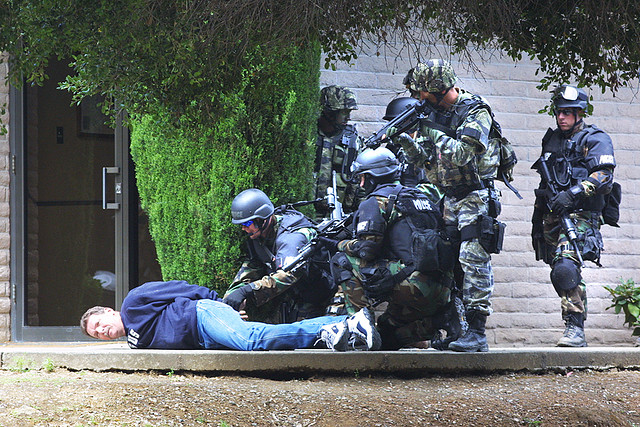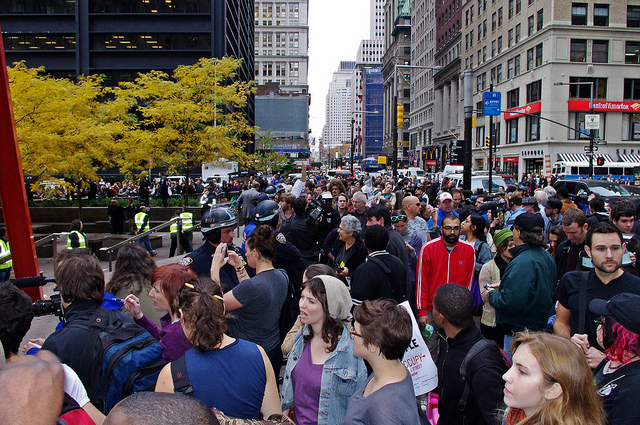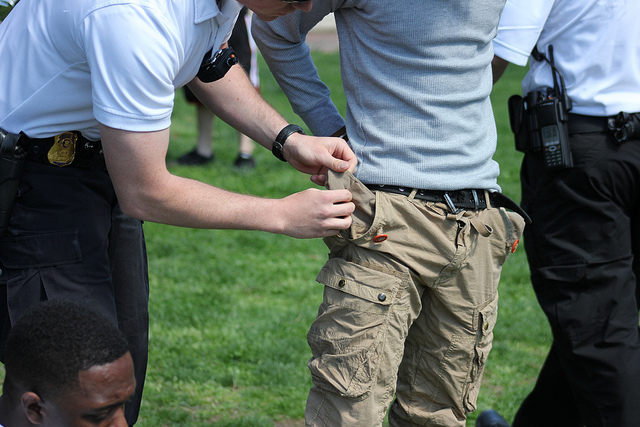
SWAT-incustody
On March 3, 1991, George Holliday heard a commotion outside of his apartment building, reached for his new Sony Handicam and made history from the vantage point of his balcony. Holliday recorded the beating of Rodney King by LAPD police officers. His actions held the police accountable and sparked a new paradigm in the way we share news.
The Internet was still in the digital womb when Holliday made his recording, so he handed it over to the media. The fallout from the acquittal of the officers charged in the assault led to massive rioting. It also created a dynamic where law enforcement administration realized that more oversight was needed.
Fast forward 23 years – the camcorder has largely been replaced by smaller and more powerful technology that is carried in the hands of the majority of Americans. According to a study published by the Pew Research Center in June 2013, 56 percent of Americans own a smartphone. Smart phones, wearable body cameras like GoPro and other recording devices have created a culture of reverse surveillance or souseveillance. The soon to be released Google glass and similar products will be a welcome addition in the arsenal of citizen or vigilante journalists.
This movement could be a backlash to the prevalence of CCTV cameras recording our every move. It could be that citizens are becoming more interested in social justice and are fighting back with cameras instead of weapons, or maybe it is just our desire to get that video that will go viral and give us our 15 minutes of fame or some money in our pocket.
The increase in citizen surveillance has motivated law enforcement to hold their own accountable. Dashboard cams and wearable cameras have enabled the police to do a better job, obtain more video evidence of crimes and protect the police from allegations of misconduct. That doesn’t mean that police departments won’t bury that video or contain situations that could bring more scrutiny on their department.
Citizen journalists increase awareness of issues that are ignored by the major media outlets. The people are holding not only the police accountable, but also the mainstream media who may have their own political or corporate agenda. We witnessed this during the Occupy protests. Uncensored video is exposing the truth. It is you, the people, who are making that happen.
Whatever your motivation, you have to know your rights before you pull out that camera and start clicking or recording.

Day 60 Occupy Wall Street November 15 2011
What are my rights under federal and state law?
There is still a misconception that it isn’t legal to record police activity, and the police would like to foster that belief. It is your constitutional right to take photographs or video of police activity in a public place.
Your First Amendment rights to photograph or videotape police has been upheld by a number of U.S. Courts of Appeals:
- First Circuit Court of Appeals which holds jurisdiction over the districts of Maine, Massachusetts, New Hampshire, Puerto Rico and Rhode Island.
- Seventh Circuit Court of Appeals which holds jurisdiction over the districts of Illinois, Indiana, and Wisconsin.
- Ninth Circuit Court of Appeals which holds jurisdiction over the districts of Alaska, Arizona, California, Guam, Hawaii, Idaho, Montana, Nevada, the Northern Mariana Islands, Oregon, and Washington.
- Eleventh Circuit Court of Appeals which holds jurisdiction over the districts of Alabama, Florida and Georgia.
The Department of Justice has also lent their voice to this issue, with a letter to the Baltimore City Police Department in 2012 and another letter sent in 2013 to the U.S District Court in Maryland in support of the rights of citizens to record activities of police officers – “The United States urges the Court to find that both the First and Fourth Amendments protect an individual who peacefully photographs police activity on a public street.”
There are some caveats that you should be aware of when taking a photograph or video:
- You can photograph or take video anywhere that a person does not have an expectation of privacy – such as a washroom or dressing room. This included federal and state government buildings.
- If you are on private property, you must abide by their rules and permission must be granted to film or you could be arrested for trespassing.
- In most cases, police cannot demand to see your video, confiscate your camera or phone without a warrant. They cannot delete your footage. If you captured a crime in progress, there are situations where the police may obtain your video as evidence, although they may still need a warrant.
- A police officer may order you to leave the area and stop filming if it legitimately interferes with police activities or if it endangers you or others.
- Don’t pull your camera or phone out of your pocket in front of the police or point it at them. They may believe you are going for a weapon and this could give them reason to use force or draw their weapons. You could end up dead.
Here are more resources:
The Digital Media Law Project provides more information on their website.
The American Civil Liberties Union (ACLU) “Know Your Rights: Photographers”
Photography is Not a Crime is the website of Miami photojournalist Carlos Miller. He was arrested for taking photographs of Miami police officers in 2007. He has been arrested a number of times in the course of his job and been acquitted every time.
The Issue with Audio
Make sure you know your state’s regulations when it comes to audio recording. Wiretapping laws were put into place to prohibit the recording of private conversations by someone who is not a party to the conversation, usually over the phone or by eavesdropping. This rule doesn’t always apply to videotaping in public, but it could be used against you. Do you know the difference between “one-party consent” and “two-party consent”?
Federal law permits recording with the consent of one party. That means that as long as you are a party to the conversation, it is legal to record the conversation. If you are not a party to the conversation, you must have permission from one of the parties. A number of states also permit “one-party consent”.
In a “two-party consent” state, you must have permission from everyone if you are recording audio, whether there are two or ten people involved. Those states are: California, Connecticut, Florida, Illinois, Maryland, Massachusetts, Montana, Nevada, New Hampshire, Pennsylvania and Washington. You can access a list of state statutes here.
If you are a third party and there is no reasonable expectation of privacy, most states allow video recording with audio.
According to the ACLU, “the legality of taping will depend on whether the state’s prohibition on taping applies only when there is a reasonable expectation of privacy. But that is the case in nearly all states, and no state court has held that police officers performing their job in public have a reasonable expectation.”
Recording Police Activities in a Foreign Country
Human rights violations by law enforcement are even more egregious in other parts of the world. If you witness police violence or injustice in a foreign country, you must be extremely careful, and it would probably be in your best interest not to record those events. Many countries don’t have the same protections that we have in the U.S. If you feel morally obligated to document events, be prepared to be arrested.
Our closest neighbors have similar rights to those in the U.S. Under Canada’s Charter of Rights and Freedoms, you have the right to record the actions of police. There is no law in Canada’s Criminal Code that prohibits this activity.
Stand Up for Your Rights and Be Professional
Being polite goes a long way, especially with law enforcement. If you’ve ever been stopped by police for even a traffic ticket, you know that they will be nicer to you if you treat them with respect. Even if a cop confronts you or hassles you about recording, remain calm, but stand your ground. Do not physically resist an officer, or you could be charged.
If the police detain you or question you, you should cooperate as best as you can. The police don’t have to tell you that you have the right to leave if they stop you, or refuse to answer questions. It’s up to you to know your rights.
You have the right to ask, and should ask if you are free to go. If you don’t ask this question, it is considered that you are voluntarily consenting to be detained. Unless there is reasonable suspicion that you are in the process of committing a crime or are about to commit one, the police have no grounds to detain you in most states. Ask the officer why you are being detained, but don’t shout, use profanity or call the officer names. Tell the officer that you are exercising your First Amendment rights. A “Terry stop” or “stop and identify” statutes in 24 states allow the police to detain a person and ask them to identify themselves. If you are arrested, you should contact your local ACLU and a lawyer.
If you are recording sound, don’t talk while you are filming. If you are making derogatory comments about the police, swearing or saying anything stupid, that is going to make your video less important. A real journalist knows when to keep quiet and you will draw less attention to the fact you are recording police activity if you stay silent and concentrate on filming.
If you post a video online, let that speak for itself. Adding any written description or content must be done with caution, as you could leave yourself open to a libel suit if you misidentify someone or state emphatically that someone is guilty of a crime. Professional journalists are cognizant of libel laws, and you should know the law.

Arrest.WeedDay.Rally.LafayettePark.WD C.20April2013
How to Obtain, Save and Share Photographs and Video of Police Activity
It seems easy enough press a button a take a photo or start recording, but things can go wrong. The most common mistake is forgetting to press record. When something is happened that is frightening or exciting, it’s easy to make that mistake. Always double check.
If your device has a date and time stamp, make sure it is set correctly. Citizen videos and photographs may be used in court, but the wrong date or time reduces the value of your recording.
It’s much easier to be discreet about filming if you have the right tools. A large lens on an SLR is going to stand out much more than a camera phone. If you are involved in legal and peaceful activities where you are constantly being hassled by police, such as a protest movement, you should invest in smaller cameras.
There are a number of smartphone apps available that are designed specifically for recording police activity. The apps are designed to help you videotape discreetly, store your recording or stream it in the cloud.
Some ACLU chapters provide free applications for your use. You can also offer a donation to the organization.
“Police Tape” is an Android or iPhone application that is available for free from the ACLU of New Jersey. The app allows you to record discreet video with audio which does not show on the screen once you start recording. You can send a copy of the video to the New Jersey ACLU for backup. This app also includes a copy of the ACLU’s “Know Your Rights”. You don’t have to be in New Jersey to use this app, but you should be aware of your state laws when recording audio.
“Stop and Frisk Watch” is a similar app courtesy of the New York ACLU. It is also available in Spanish on the Android version.
“OpenWatch” has developed an entire suite of free apps that are available for iPhone or Android to facilitate recording, storing and transmitting videos of police activity. OpenWatch analyzes your video, enhances the quality of the video and removes identifying information before posting online. The global citizen journalist site’s goal is “building a more transparent and less corrupt society.”
“Cop Block” is “a decentralized project supported by a diverse group of individuals united by their shared goal of police accountability.” They provide links to even more apps that can help you obtain those images, keep them safe from police confiscation and publish them online. Cop Block also has a link to an extensive library of materials.
Many of these sites also provide forums, technical advice and other resources where you can learn about your rights and find out how you can get involved as a citizen journalist.
The Ethical and Moral Ramifications of Documenting and Sharing Videos Starring the Police
Most professional journalists adopt a Code of Ethics and value their professional integrity. You aren’t held to the same standards, but you should remember your own moral code when you are documenting events. Why are you filming this? Are you looking for a big payday from the media or are you doing it because you are a concerned citizen?
The new breed of citizen journalists believes they should be paid for their work. If you happen to be in the right place at the right time and have a newsworthy scoop, you could negotiate a licensing fee from a broadcaster. You could also just post it on YouTube for free, if all you care about is getting your message out there.
George Holliday sold his Rodney King video to TV station KTLA for $500. They released it to CNN and from there it took on a life of its own. Holliday sued CNN but the case was dismissed. He made the mistake of selling the video and not the broadcast rights.
You have to consider the impact your documentation will have:
- Is this footage going to expose police wrongdoing or are you doing it to cause trouble when the police are just going about their business and not hurting anyone?
- What about the person being arrested? You may be exposing police corruption, but you are also revealing the arrest of someone who is innocent until proven guilty. How will this affect the reputation of the person being arrested?
- You could possibly compromise a police investigation. If you photograph or videotape undercover officers making a big drug bust, you are exposing those officer’s identities to the criminals.
- In extreme cases, such as matters of national security, is it better to let the police do their job or should you be getting in their way?
These are all relevant questions you need to ask yourself before you send that video or photograph out into the world.
We’ve talked about a lot of negative police actions captured and shared with the public, but we also need to know the good things law enforcement do. There are plenty of good cops out there who truly believe it is there job to serve and protect the public. Take those videos and share them.
Jennifer Foster took a photograph of Officer Larry DePrimo of the New York City Police Department when she was visiting New York City back on November 14, 2012. He noticed a homeless man sitting on the street with no socks or shoes and went to a nearby shoe store where he bought the man some socks and boots. The photograph of DePrimo helping the man put on the boots went viral. He later stated that he had no idea anyone had taken a photograph of the event.
This January, a Texas woman, Ronda Fox took a photograph of Odessa Police Corporal Jeremy Walsh as he took a pair of boots out of the trunk of his cruiser and gave them to a homeless man.
Filming and sharing these acts of kindness helps to erase that border known as the blue line and humanize police. That’s a good thing.
Journalists often face criticism because they are behind the camera when people feel they should have stepped in and done something to help someone or save a life instead of capturing an incident on film. Some seasoned journalists have had to make very difficult ethical choices in these cases. While you can’t go up against armed police and put yourself in the middle of a situation, you have to remember that you are a human being. Is the video going to change the world or save a life? Is it going to bring justice? If you witness someone in distress and you can find a way to safely help that individual, you need to be prepared to make that decision. There is probably someone else capturing the event on their camera.
